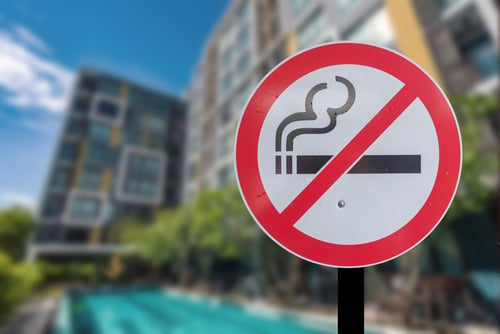
Tobacco, e-cigarettes, and now, recreational and medical marijuana are all things landlords need to address when adopting rental smoking policies in their investment properties. While keeping tenants happy is a priority, so is the health and well-being of other tenants as well as the property itself. That said, smokers are not protected under the Fair Housing Act. Thus, landlords can impose the policies they see fit as long as they do not violate any other local, state, or federal law. This includes issuing a blanket “no smoking” policy. Join us below as we discuss how to establish rental smoking policies and what to include below.
What Does the Law Say About Rental Smoking Policies?
Typically, rental smoking policies will either restrict smoking in public areas or extend to property-wide bans. However, before imposing any new restrictions on your rental property, researching applicable laws is a must. While this may vary based on location, let’s review a few basics for landlords below –
Banning Smoking is Not Discrimination
Many landlords may worry that by banning smokers, they may be violating Fair Housing Law. However, this is not correct as no state or federal law protects or provides an individual right to smoke where or when they want to.
What are the Federal Smoking Laws?
The government can and does regulate the use of substances such as tobacco and marijuana in public spaces. Let’s review some specifics below –
- Tobacco – Tobacco is legal and therefore not restricted in private rentals. However, HUD does have certain minimum restrictions for public housing, including – no smoking in all indoor areas or outdoor areas within 25 feet of the building. This includes the use of cigarettes, cigars, pipes, and water pipes.
- Marijuana – The use of marijuana in any form is illegal under federal law, even with a medical license. So, possessing this substance exposes tenants to possible legal action.
How do States Handle Smoking Laws?
Each state or local jurisdiction has the authority to create laws or restrictions on smoking. The goal is to protect the general safety and health of the general public. While some states have laws restricting smoking in public areas or multi-family buildings, landlords must research their particular location. In addition to pipes, cigars, and cigarettes, these laws can also extend to vaping and e-cigarettes.
When it comes to marijuana, it may be illegal, approved for medical use, or open to recreational use. So, where the property is may affect certain restrictions on the use of marijuana. However, a no smoking policy is a no smoking policy regardless of the substance.
How to Create Rental Smoking Policies for Your Rental
Any rule a landlord intends to impose must comply with all applicable laws. Once that is determined, it is time to set up a policy and add it to the rental agreement. Thankfully, these rules are widespread, and there are several resources for landlords on how to write a no-smoking lease clause. However, to get you started, check out these simple steps below.
- Settle on the Details
- Communicate Clearly
- Address Smokers During the Screening Process
- Prepare to Enforce the Rules
Settle on the Details
Any policy begins with considering and then ironing out all of the details. To establish rental smoking policies, landlords must decide how strict or lenient they intend to be. To help you begin, start by answering the questions below –
- Will the property be 100% smoke-free?
- If not smoke-free, under what conditions or in what areas is smoking allowed?
- What are the consequences of violating a no-smoking policy?
- If you allow smoking, are there any special conditions, such as an additional security deposit?
While most no-smoking policies focus on tobacco, nowadays, landlords must also consider electronic cigarettes and marijuana. Therefore, be sure to specify no smoking of any kind and clearly address any alternatives to traditional cigarettes when creating your lease policies.
Communicate Clearly
From the time a vacancy listing goes live to the time a tenant picks up their keys, there are countless communications back and forth. At every step of the way, a landlord must keep their policies transparent and communicate them clearly. If the policy is new and you have existing tenants, be sure to share the latest changes in writing. This will help them know what to expect and when the policies will go into effect.
Furthermore, as part of a professional communication strategy, always answer questions to ensure tenants understand their responsibilities. Finally, keep in mind that if the existing lease does not prohibit smoking, a signed addendum is needed to begin enforcing the policy on tenants already in place.
Address Smokers During the Screening Process
Like no pet policies, no smoking policies matter a great deal to the tenants they affect. That said, landlords need to be upfront and communicate any restricting policies early on to save both the tenant and landlord’s time. Therefore, consider adding this directly to marketing ads. If the property can boast “100% Smoke-Free,” it will weed out smokers from the tenant pool while attracting others.
Prepare to Enforce the Rules
A rule is only good if the landlord is willing to enforce it. So, if policies in the lease prohibit smoking, then evidence of smoking could result in adverse action against the tenant. This could include loss of security deposit to cover damages such as the cost to repaint, perform deep cleaning, or pay for an ozone restoration treatment. In addition, smoking would be a lease violation that could result in the eviction of the tenant.
The Pros and Cons of Rental Smoking Policies
Every policy a landlord puts in place will have advantages and disadvantages. However, when it comes to rental smoking policies, the pros far outweigh the cons. Read on below to find out more.

Benefits of Adopting Rental Smoking Policies
- Protecting Community Health – Exposure to secondhand smoke is a health risk to all as it elevates the chances of individuals developing lung cancer. However, it can also lead to other health concerns, so more and more businesses, public spaces, and private property have developed restrictions to limit smoking.
- Following the Fair Housing Act – While the Fair Housing Act does not protect smokers, it does protect individuals with disabilities. In addition, some industry experts believe that prohibiting smoking protects other vulnerable tenants that may have conditions that are worsened by secondhand smoke.
- Fewer Complaints – Unfortunately, smoke does not stay in a single unit. In fact, the smoke and fumes can drift into common areas and infiltrate neighboring apartments. Therefore, allowing a tenant to smoke in one unit can easily result in complaints from the others. That said, this is not a worry with rental smoking policies in place.
- Avoid Legal Troubles – Secondhand smoke has led to some tenants suing their landlord over failing to enforce no-smoking policies in multi-family buildings. While this may be an extreme example, it can happen, and having strict guidelines in place backed up by strict enforcement, will help avoid these legal threats.
- Enhanced Safety – Cigarettes or smoking of any kind presents an inherent risk of fire. A carelessly handled cigarette could potentially cause significant damage to the rental or neighboring properties.
The Downside of Restricting Tenant Smoking
- A Few Less Leads – Any restriction put in place will automatically eliminate some potential prospects from becoming tenants. That said, landlords trying to fill vacancies quickly may see this as a downside. However, adopting rental smoking policies will be better for the property and neighboring tenants in the long run.
Stress-Free Lease Compliance and Legal Policies
Whether taking on rental smoking policies or other legally allowable restrictions, landlords must be vigilant in communicating and enforcing these rules. However, landlords cannot be everywhere at once, and managing the day-to-day of multiple rental properties is a challenge. Therefore, savvy landlords turn to professional rental management to ensure that all lease policies follow applicable law and are strictly enforced to protect the property and the community.
Smoking causes health and property damage concerns for landlords. Therefore, it must not be taken lightly. So, take the time to create a no smoking policy for your rental and reach out to Bay Property Management Group for all of your rental needs. Our experienced team can assist with a legally binding lease, thorough screening process, and ongoing management efforts through the tenancy focused on protecting the owner’s interests. If you would like to learn more about the benefits of full-service property management, give us a call today.

